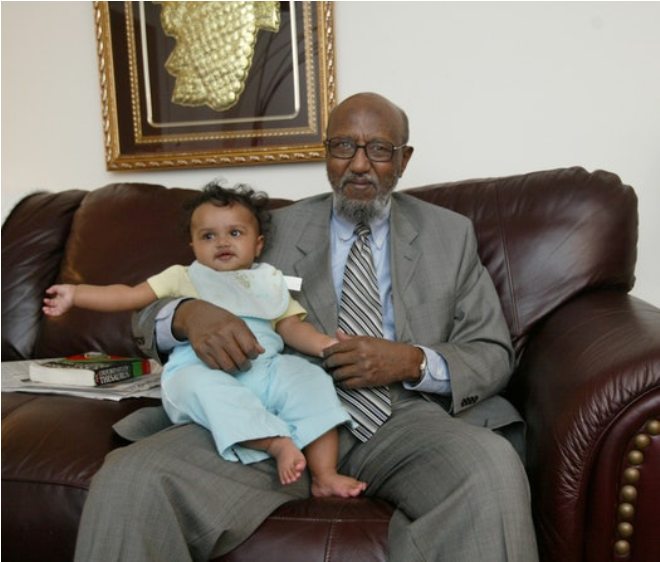
Saturday November 11, 2017
Mohammed Abshire Musa, a leader of the independence movement in Somalia, retired to Minnesota. He died on Oct. 25. (Star Tribune file photo)

In one of the world’s most war-torn countries, Gen. Mohamed Abshir Musa was a peacemaker.
At 32, he became commander of independent Somalia’s first national police force in 1960, and spent his life working for democracy and unification. But he paid a high price for those ideals and his ties to America.
After a Soviet-backed military coup established Siad Barre as the nation’s leader in 1969, Abshir was imprisoned in a remote desert jail for more than nine years.
He returned from the experience more determined to fight for freedom, said those who knew him.
“He’s one of the real heroes of the African independence movement,” said Robert Gosende, who worked at the U.S. embassy in Somalia in the 1960s and returned as U.S. ambassador in 1992 and 1993 during the height of the humanitarian crisis. “There’s no stronger friend we had in Somalia than Abshir.”
Abshir, who moved to Minnesota in 2001, died Oct. 25 of respiratory failure. He was 91.
Over the course of his life, Abshir challenged warlords and spoke out against Barre’s brutal regime. He worked with international military leaders, businessmen and political and religious elite who shared his vision.
He met presidents John F. Kennedy and George H.W. Bush, and welcomed vice president Hubert Humphrey and Supreme Court Justice Thurgood Marshall to his country. In early 1962, he won a grant from the U.S. government to study at Princeton University.
Abshir was mourned by Somali poets, political leaders and everyday citizens, who said his death marked the “end of a bygone era” in their country.
“One of the most professional of post-independence Somalis,” said Ahmed Samatar, a professor of international studies at Macalester College via e-mail from Somalia. “He was an exemplar of steely character, rare personal integrity and high civic virtue.”
During the chaotic early 1990s, marked by famine and civil war after Barre’s ousting, Abshir established a regional government in the northeastern region of Somalia. He maintained a relative peace by setting up a clan-based council of elders that drew members various subclans and minorities, according to a 1997 New York Times story.
“In the northeast, God forbid, we disagree but we don’t shoot each other,” Abshir told the newspaper.
Abshir worked with the U.S. military after President George H.W. Bush sent troops to protect humanitarian relief supplies in 1993, and his insight was credited with saving soldiers’ lives.
In 2003, the U.S. threatened to deport him as part of a post-9/11 crackdown. Six former U.S. ambassadors and special envoys demanded intervention from Secretary of State Colin Powell. At the time, Abshir and his late wife, Miriam Moses Gul, were living in Eden Prairie and caring for a son with multiple sclerosis.
Martin Ganzglass, then a Washington, D.C.-based lawyer, came to Minnesota to testify before an immigration judge, who ultimately granted Abshir political asylum.
“He was a democrat with a small ‘d’ … not a war criminal,” said Ganzglass, who met Abshir in 1966 as a Peace Corps lawyer and remained a lifelong friend. “He believed that Somalia should not revert to tribalism or clannism, that we’re all Somalis and we need to build a nation together.”
Abshir’s admirers said his arrest without a trial prevented a man of vision from making lasting change in the nascent days of Somalia’s independence.
“He was cut down in his prime by a malevolent, murderous dictatorship,” said Gosende, the former ambassador.
During his years in the Laanta Bur prison, about 55 miles south of Mogadishu, he and another prisoner communicated by tapping Morse code on their toilets, Ganzglass said. Guards confiscated his only copy of the Qur’an, so one of Abshir’s prison mates wrote as many verses as he could in an exercise book and smuggled it into Abshir’s cell, according to another detainee’s written account. Abshir told friends he survived by memorizing the verses.
“You may have heard that I became a fundamentalist,” Gosende said Abshir told him after he was released in June 1982 — gaunt, but still indomitable. “It’s true. I am a fundamentalist in favor of freedom.”
Abshir’s oldest son, Abdulrahim Mohamed Abshir of Chaska, was one of four children born during house arrest before Abshir was imprisoned.
“I didn’t even know what my father looked like. I only knew my father’s picture,” Abdulrahim said.
Abshir had grown weaker in the last few years, but his son said that “he lived a happy life” in Minnesota after retiring from public life in 2000 following a final push to gather Somali groups to form a national government.
Abshir is survived by 14 children. Services have been held.